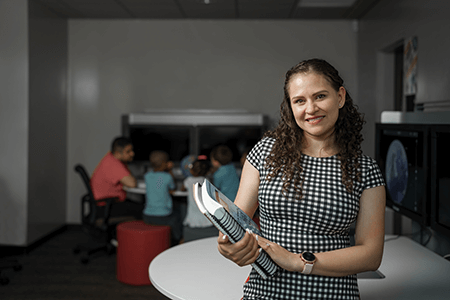Traditional or Alternative Teacher Licensure: Which is Right for Me?
If you hold a bachelor's degree, pursuing a graduate degree in education can open the door to a bright future where you get to make a lasting impact.
How do I know if teaching is the right path for me?
If you want to enter a profession where you can hone and share your knowledge, help students identify and pursue their passions, and positively impact learners who will become our future leaders, a career in teaching is an ideal path to chart.
Plus, you can make a difference across the state. Illinois is currently facing a severe teaching shortage that has affected multiple regions and areas of study. The next generation of youth needs qualified educators who strive to enrich their students' lives.
What credentials do I need to teach?
To teach in the state of Illinois, you'll need a bachelor's degree and a teaching license. After choosing whether you want to focus on a specific subject area, like reading, or a certain student population, such as the special education area, you can determine which educator preparation program and degree type is the right fit for you.

Does my bachelor's degree need to be in education to pursue a graduate degree and teaching certification?
You can become a licensed teacher regardless of your undergraduate area of study. Though the requirements for becoming a teacher vary by state, district, and grade level, candidates with bachelor's degrees in any subject may be eligible to pursue an advanced degree in education and licensure.
Why should I get a master's degree in education?
A master's degree in education will give you an opportunity to train in a specialized area and broaden your knowledge, grow as a leader, improve your teaching skills, stand out from your peers, strengthen your job security, and earn a greater income. There are generally two routes to take: traditional and alternative.
What is traditional licensure?
The traditional licensure path forges opportunities to develop specialized teaching skills with a blend of modern pedagogy, personalized mentorship, and real-world applications. Traditional licensure preparation focuses on research-based practices, the connection between theory and application in the classroom, and the support of student needs. Students will enroll in subject-specific coursework, foundational and advanced education courses, and teaching methods courses, many of them with embedded clinical practice application components.
Generally, completion of a traditional licensure program can take approximately two years and requires a culminating semester of student-teaching in which students are placed in a classroom with a cooperating teacher.
What is alternative licensure?
Alternative routes are ideal for those who need to earn a salary while pursuing a teaching license. Students enter into a two-year residency, which allows them to work as teachers of record under a provisional license and get paid to teach during their time in the program. Generally, an alternative licensure program follows rigorous guidelines that include accelerated coursework, field experiences, teaching experiences and licensure testing. This program is completed in approximately two years, and students are guided by site-based and university-based mentors during their residency experiences.
So, what's the difference?
Completion of both the traditional licensure program and the alternative licensure program results in a master's degree and an Illinois Professional Educator License (PEL), but each program is unique.
Alternative licensure candidates can implement what they're learning in their programs into their classrooms in real time, as they're learning and working for a salary concurrently. Traditional licensure candidates spend the majority of their program learning from mentors before they enter the classroom for their final semester of student-teaching. Both programs require the passing of a content area test specific to the area of licensure. Both programs offer varying levels of flexibility, valuable insight from expert educators, and high-impact practices that prepare students for success in the classroom, regardless of which path they choose.
Once I choose, what should I look for in a graduate education program?
A good graduate education program will offer hands-on, high-impact practices, one-to-one mentorship and guidance, a rigorous, innovative Illinois State Board of Education (ISBE} approved curriculum, small class sizes to build peer camaraderie and allow for individualized attention, and flexibility of licensure areas and modalities.
What is the career outlook for a teacher?
Having a master's degree in education will boost your credentials, enhance your hiring power, and potentially secure a higher salary. According to Lightcast, a global leader in labor market analytics, the education field is expected to grow by 4.7% through 2031, with a median salary in the 50th percentile. Most importantly, though, your impact on students will inspire and motivate them to become well developed, successful, and service-oriented pillars of society.
Request Information
Want to know more about graduate programs at Saint Xavier University? Please fill out the form below!